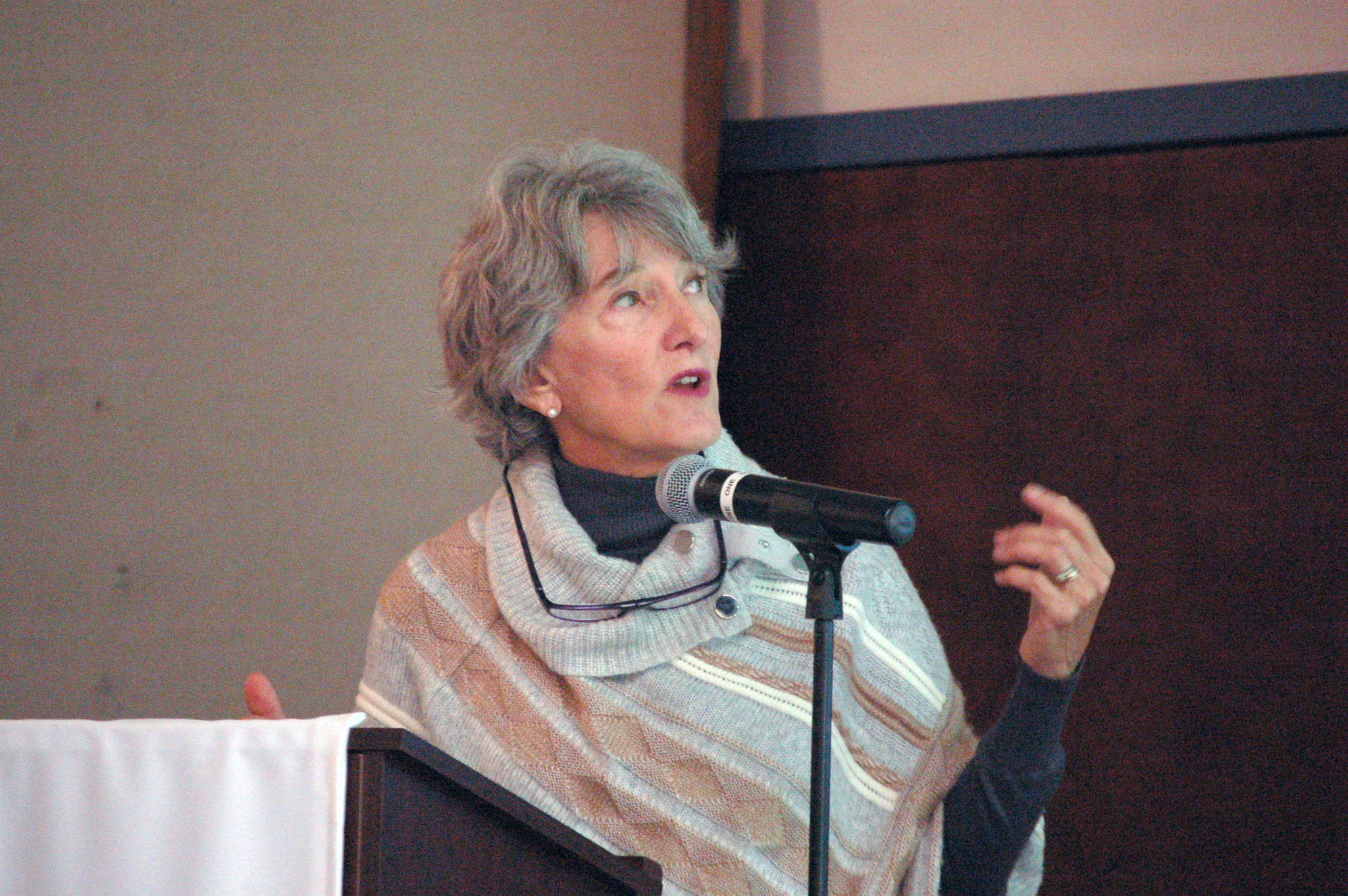Do your homework before voting no — that was the message a former judge gave members of the business community during a presentation Wednesday.
At a joint Kenai and Soldotna chamber luncheon Wednesday, Senior Judge Elaine Andrews discussed Alaska’s merit-based judge selection system and emphasized the importance of informed voter deliberation on judge retention.
Under Alaska’s constitution, judges are not chosen through contested elections, but are selected based on merit and retained based on performance, said Andrews, who retired after two decades on the Anchorage Superior Court.
Because races aren’t contested and thus lack the signs, commercials and promotional material associated with political races, voters may go to the polls not knowing anything about the judges on the ballot. Voters who don’t recognize the names in front of them might be tempted to vote on a whim — or simply vote no, Andrews said.
“I’m going to caution you not to do that,” Andrews said. “There’s a huge amount of resources spent to evaluate sitting judges.”
Andrews said judges typically get at least 30 percent no votes — regardless of qualifications or performance.
“So even if you’re truly the best judge in the state, you probably cannot get over about a 70 percent approval,” Andrews said.
In 2018, 15 Alaska judges are up for retention, nine of whom are in the Third District — which includes Anchorage, Palmer and the Kenai Peninsula. Kenai District Court Judge Sharon Illsley is the local judge who will be on the ballot in November.
Voters, who may have little to no knowledge of the other eight judges, should be prepared before casting a ballot, Susanne DiPietro, executive director of the Alaska Judicial Council.
Made up of seven members — three lawyers, three members of the public and a chief justice, the Judicial Council recommends candidates for appointment and evaluates a judge’s performance ahead of elections. The council then provides a recommendation to retain the judge or not.
In Alaska, District Court judges must go up for retention every four years, and Superior Court judges every six years. Court of Appeals judges must go up for retention every eight. Judges on the Supreme Court of Alaska face 10-year retention terms.
Andrews emphasized the extensive nomination and review process that each judge goes through — both before appointment and ahead of their retention vote.
Judges and judicial candidates are evaluated on a number of criteria, such as the ability to be fair and impartial, integrity, temperament, legal skills, professional competence, diligence and both and legal and “human” experience, Andrews said.
“We’re making decisions that take some life experience to understand how complex life can be,” she said.
In order to be considered for a judgeship in Alaska, applicants must meet a minimum standard of being a lawyer with five years of practice in Alaska — but also must fill out an extended application that delves into professional and personal history.
Applicants’ names are sent out to all the lawyers in the state, who send feedback on the candidate.
“It’s a very daunting process to do this — because your name goes out and the lawyers then rate you on these critical aspects on what makes a good judge,” Andrews said.
The Judicial Council also examines a candidate’s personal background, including former addresses, credit standing and references.
“It’s a little bit like applying for an FBI clearance,” Andrews said.
Candidates receive scores based on their peer assessments, are interviewed and members of the public weigh in on a candidate’s qualifications before the council sends at least two candidates’ names to the governor for selection.
When a judge faces retention, the Judicial Council again does a performance evaluation, which includes conducing surveys of those who have seen the judge in action, such as police, probation officers, court employees, attorneys, jurors and social workers.
The council will also assess the judge’s performance on the bench — whether or not they’ve made legal mistakes, had any disciplinary issues or were unable to complete decisions in a timely manner.
“So it’s not a rubber stamp. It’s a very careful analysis,” Andrews said. “You should have confidence when you go in the voting booth, these people have been vetted.”
The Judicial Council provides its findings on its website and in voter pamphlets, with recommendations to retain or not.
“If there’s one thing I could tell people is go to the Judicial Council website and see that the Judicial Council has recommended for the retention of all those judges and vote yes. Or go to the Judicial Council website and study the evaluation materials on each of those nine judges because you’re going to be asked to vote. Their names are going to be sitting there staring at you,” DiPietro said.
Kenai Chamber of Commerce President Johna Beech said the presentation was part of a larger effort to promote civic responsibility among chamber members and the community.
“We like to educate people in regards to the voting process. That’s why we host candidate forums. We talk about ballot propositions and this is just another component of it — being an informed voter,” she said. “And so by not voting — or voting no because you’re not educated on the issue or the person — is not necessarily the best way to go about it.”
Reach Erin Thompson at ethompson@peninsulaclarion.com.

